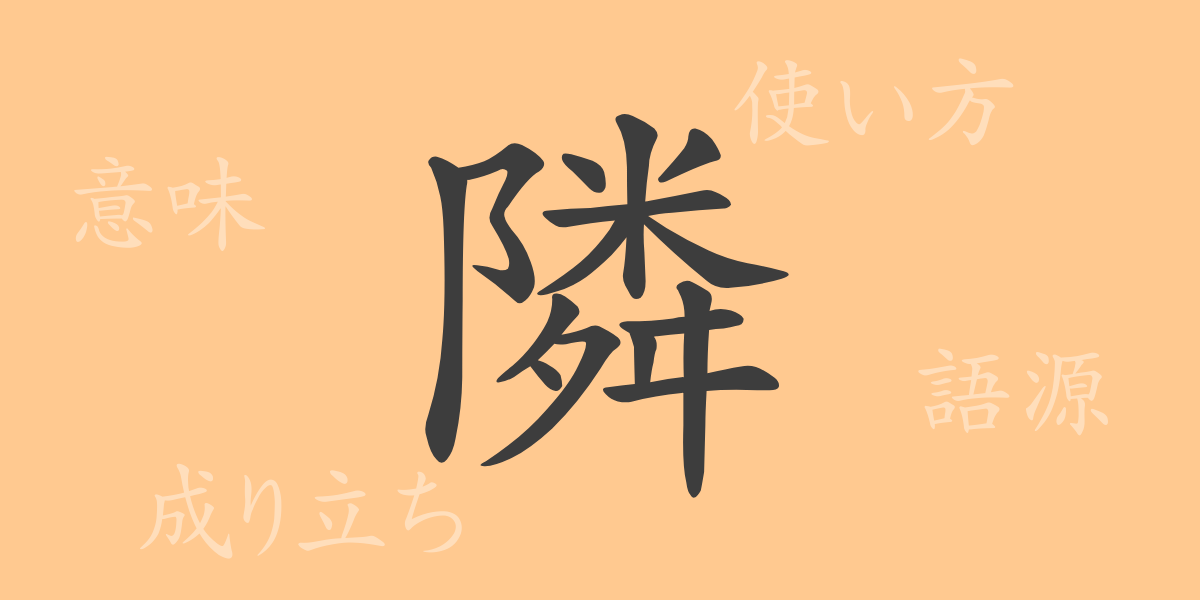The Japanese language is rich with kanji (漢字, kanji) characters that carry profound meanings beyond mere letters. “隣” (となり, tonari) is one such character, representing concepts deeply intertwined with our daily lives. In this article, we will delve into the origins and modern usage of the kanji “隣” (となり, tonari), uncovering its charm and significance. Join us as we explore the world of “隣” (となり, tonari), a kanji beloved in everyday Japanese.
Origins of 隣 (となり, tonari)
The kanji “隣” (となり, tonari) originated in ancient China. Initially, it combined the character “粦” (representing fire) with “門” (もん, mon, meaning gate), symbolizing the light from “粦” reaching the neighboring house. This imagery evolved to signify adjacent houses and close proximity between people. Over time, it was introduced to Japan, where it developed uniquely, settling into its modern form.
Meaning and Usage of 隣 (となり, tonari)
“隣” (となり, tonari) denotes “adjacent” in a physical space and metaphorically refers to “close relationships.” For example, it describes the state of houses or seats being next to each other, as in “隣の家” (となりのいえ, tonari no ie, neighboring house) and “隣の席” (となりのせき, tonari no seki, adjacent seat). Additionally, the term “隣人” (りんじん, rinjin) is commonly used to describe a neighbor.
Reading, Stroke Count, and Radical of 隣 (となり, tonari)
The kanji “隣” (となり, tonari) is noteworthy not only for its form but also for its readings and components.
- Readings: On’yomi (音読み, on’yomi) is “リン” (りん, rin), Kun’yomi (訓読み, kun’yomi) is “となり” (tonari)
- Stroke Count: 16 strokes
- Radical: 門部 (もんがまえ, mongamae)
Idioms, Phrases, and Proverbs Using 隣 (となり, tonari)
The kanji “隣” (となり, tonari) appears in numerous idioms, phrases, and proverbs. Here are a few examples:
- 隣接 (りんせつ, rinsetsu) – Adjacency or being next to each other.
- 隣保 (りんぽ, rinpo) – A mutual aid organization among neighbors.
- 隣組 (となりぐみ, tonarigumi) – A group or organization of neighboring residents.
- 隣人 (りんじん, rinjin) – A person who lives next door.
- 隣国 (りんごく, ringoku) – A neighboring country.
- 「隣の芝生は青い」 (となりのしばふはあおい, tonari no shibafu wa aoi) – A proverb expressing the psychological tendency to see others’ possessions or situations as better than one’s own.
Summary of 隣 (となり, tonari)
Each kanji carries rich history and culture in its form and sound. “隣” (となり, tonari) plays a vital role in our lives, symbolizing relationships between people. Through this exploration, we have deepened our understanding of the profound meanings and expressions associated with “隣” (となり, tonari). Let us continue to cherish the stories embedded in each kanji and enjoy the richness of the Japanese language.

























